


A Chinese delegation led by senior diplomats Yang Jiechi and Wang Yi has arrived at a hotel in Alaska, US ahead of talks with American officials.
At the invitation of the US, they will hold a "high-level strategic dialogue" with US Secretary of State Antony Blinken and US National Security Advisor Jake Sullivan.
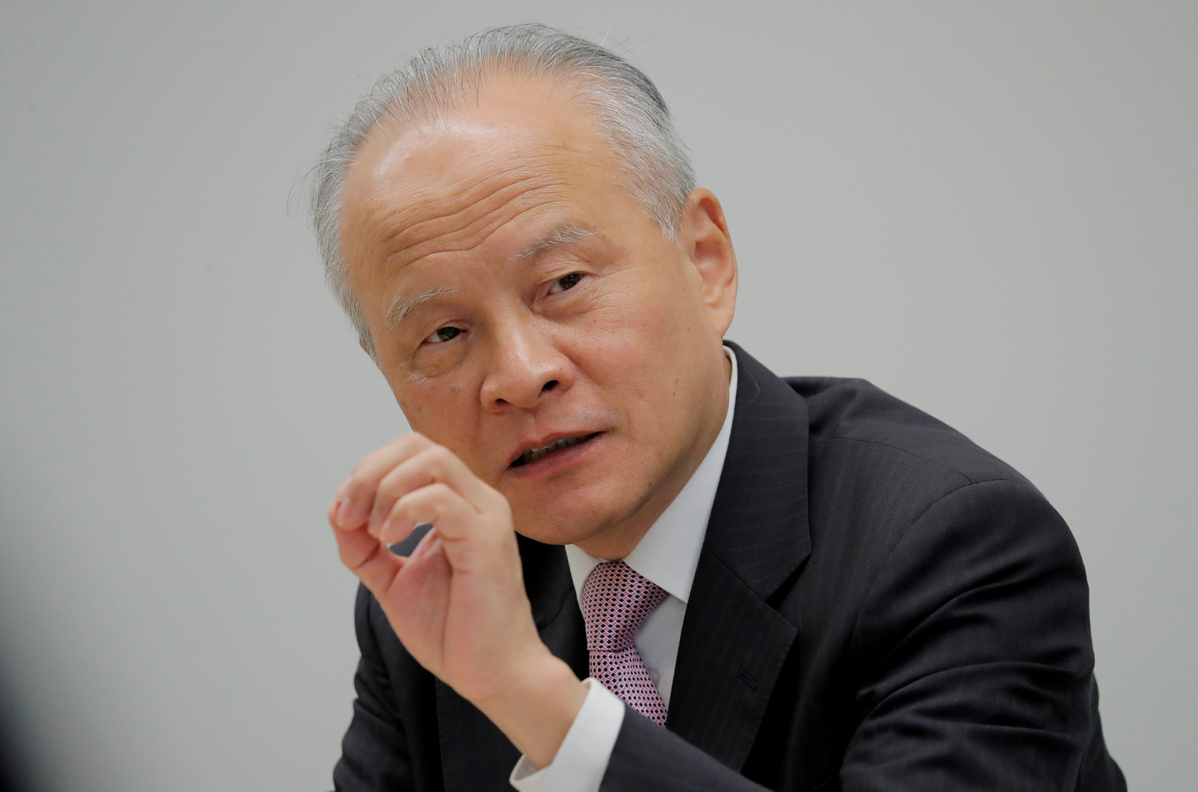
China's top envoy to the US Cui Tiankai said he hopes the first high-level China-US diplomatic meeting of the Biden presidency will pave the way for a "candid" and "constructive" exchange between the two countries, but that it is an "illusion" to expect Beijing to cave in to pressure or compromise on core interests.
US Secretary of State Antony Blinken and National Security Advisor Jake Sullivan are scheduled to meet Thursday through Friday in Anchorage, Alaska, with top Chinese diplomat Yang Jiechi and State Councilor and Foreign Minister Wang Yi, both Beijing and Washington have announced.
Ambassador Cui said both sides attach great importance to the first in-person dialogue this year at such a high level, for which China has made a lot of preparations.
"We certainly do not expect a single dialogue to resolve all the issues between China and the US; that's why we don't pin overly high expectations or have any illusions on it," Cui said on the eve of the meeting.
The ambassador said he believed the meeting would be a success if it helps kick off a process of candid, constructive and rational dialogue and communication between the two sides.
"I hope that both parties will come with sincerity and leave with a better understanding of each other," he told reporters on Wednesday.
Blinken, who would stop off in Alaska from a trip to Tokyo and Seoul said last week that the meeting would be "an important opportunity for us to lay out in very frank terms the many concerns" with Beijing.
"We'll also explore whether there are avenues for cooperation," he said in his first appearance before Congress since being confirmed as America's top diplomat.
Blinken also said that "there is no intent at this point for a series of follow-on engagements", and any engagement is contingent on "tangible outcomes" on the issues of concern with China.
Ambassador Cui said that the spirit of equality and mutual respect serves as the most basic prerequisite for dialogue between any countries.
With regard to China's core interests concerning its national sovereignty, territorial integrity and national unity, China has "no room" for compromise and concessions, he said, adding, "This is also the attitude we will make clear in this meeting.
"If they think China will compromise and give in under the pressure of other countries, or China wants to pursue the so-called ‘outcome' of this dialogue by accepting any unilateral request, I think they should give up this illusion, as this attitude will only lead the dialogue to a dead end," Cui said.
Asked if recent US actions, including Tuesday's US sanctions on Chinese officials related to Hong Kong, will affect the "atmosphere" of the Anchorage dialogue, Cui said China will take "necessary countermeasures".
"We will also express our position clearly in this meeting and will not make compromises and concessions on these issues in order to create a so-called ‘a(chǎn)tmosphere'," he said. "We'll never do that!"
The meeting came about a month after what US media reports called "an unusually long two-hour call" between US President Joe Biden and Chinese President Xi Jinping.
During that phone call, Xi said the foreign affairs departments of the two countries may have in-depth communications on wide-ranging matters in the bilateral relationship and major international and regional issues.
China's Foreign Ministry spokesperson Zhao Lijian said early on Wednesday that China hopes that, through this dialogue, the two sides can follow through on the consensus reached between the two presidents in their phone call, work in the same direction, manage differences and bring China-US relations back to "the right track of sound development".
On Tuesday, UN Secretary-General Antonio Guterres said he hoped for a "positive outcome" of the meeting, his spokesman said.
"We hope that China and the United States can find ways to collaborate on critical issues, notably on climate change, on rebuilding the post-COVID world," said spokesman Stephane Dujarric.
"We fully understand that there are tensions and outstanding issues between the two, but they should also both find ways to cooperate on the biggest global challenges that are before us," Dujarric added.
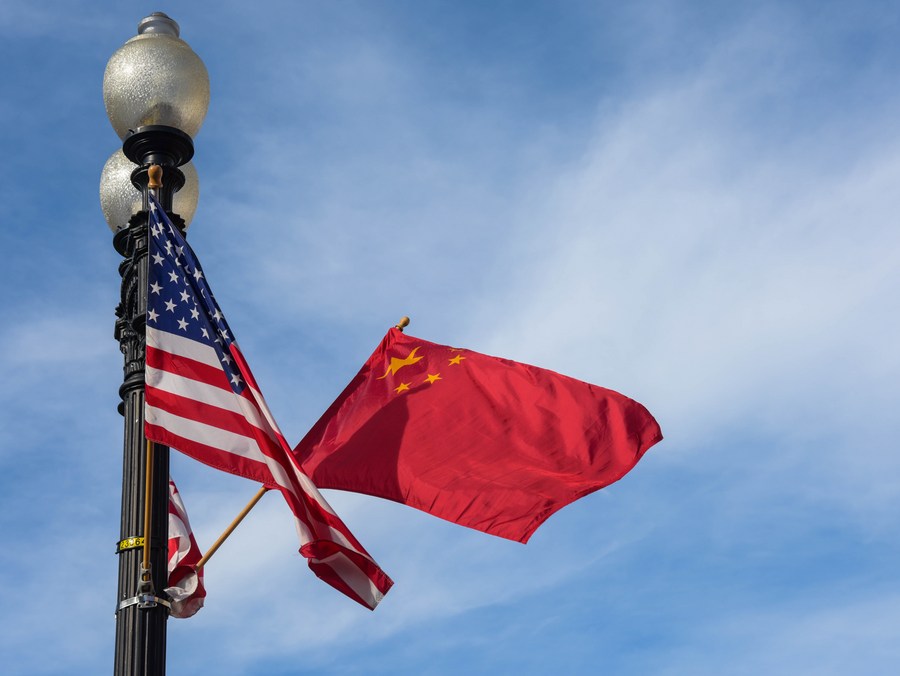
For China and the United States, whose relations have plunged to the lowest point since their establishment of diplomatic relations in the 1970s, the arrival of the long-awaited official dialogue between high-ranking diplomats undoubtedly sends a positive signal.
The time is right to seek to revive China-US relations from their historic low.
As China's top diplomats will hold a high-level strategic dialogue with their US counterparts in Alaska starting Thursday, many observers are holding their collective breath, eager to see whether their cautious optimism can translate into concrete outcomes.
The latest development comes 50 years after Dr. Henry Kissinger's legendary initial trip to Beijing. The vision and courage of political ice-breaking of that kind are still needed to ensure one of the world's most important bilateral relationships, which now stands at a new crossroads, can return to the right track at an early date.
The Chinese side has been reiterating that China and the United States should build strategic trust, avoid strategic miscalculation and manage differences. Communication and dialogue, on the basis of mutual trust and on an equal footing, are effective vehicles to achieve such aims.
The two countries need to return to normal engagement at all levels. That is the best way to reduce strategic miscalculation and doubts.
The ongoing pandemic coupled with profound changes unseen in a century have made world affairs even more complicated and unpredictable. It is the responsibility of the world's two largest economies to bring certainty to the world.
The choice China and the United States make today will have a huge impact on the future of humanity.
China has sent a clear message at the beginning of the year, calling on the Biden administration to "restore normalcy to bilateral relations and restart cooperation." From the "cooperative competition" between China and the United States proposed by former Chinese Vice Foreign Minister Fu Ying last year, to the "healthy competition" between the two sides Chinese State Councilor and Foreign Minister Wang Yi called for this month, China's US policy has been consistent and increasingly pragmatic.
To reset China-US relations, the US government should also be more pragmatic. Its deep-rooted prejudices against China should be discarded.
The short-sighted China approach and old-fashioned mindset of a zero-sum game between major powers adopted by the previous US administration should have long been abandoned.
Striving for the sustained and healthy development of bilateral relations, the two sides should respect each other's core interests and major concerns. They should also refrain from interfering in each other's internal affairs. China's position on its own internal affairs related to Xinjiang and Hong Kong has been consistent and clear. It will unwaveringly defend its sovereignty, security and development interests.
Beijing has called upon Washington to work with China to enhance cooperation in fighting the COVID-19 pandemic, restoring the global economy and tackling climate change, and foster bright prospects for the two peoples and the world at large.
As the Chinese say, the journey of a thousand miles begins with the first step. Although resetting China-US relations is difficult and can by no means be done overnight, a first step needs to be taken. The Alaska dialogue could be this very step.
High-level meeting called chance to build confidence in stability, recovery
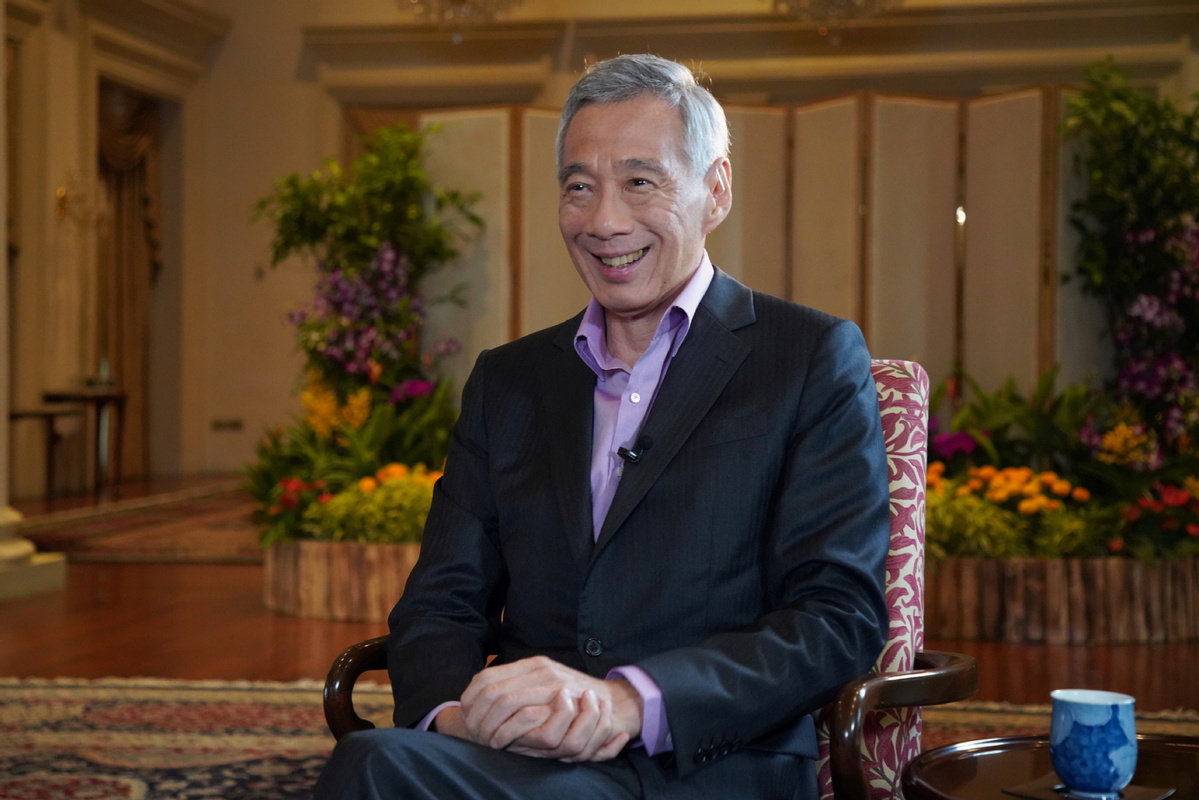
Beijing and Washington are expected to fully tap into opportunities created by their upcoming high-level strategic dialogue to mitigate hostility, prevent crises, patch up mutual trust and thus shore up global confidence in stability and recovery, world leaders and senior scholars have said.
They made the prediction at a time when China and the United States are seen as a pair of engines capable of driving the world through its severe economic downturn. It also comes amid concerns over uncertainties that haunt the top two economies' relations.
The high-level strategic dialogue, initially proposed by Washington, will be held on Thursday and Friday in Anchorage, Alaska.
The event will bring together Yang Jiechi, a member of the Political Bureau of the Communist Party of China Central Committee and director of the Office of the Foreign Affairs Commission of the CPC Central Committee, State Councilor and Foreign Minister Wang Yi, US Secretary of State Antony Blinken and US National Security Advisor Jake Sullivan.
The meeting will be the first face-to-face, high-level contact between the two governments since US President Joe Biden took office on Jan 20.
The United Nations said on Tuesday that it hopes for "a positive outcome" from the meeting.
"We hope that China and the US can find ways to collaborate on critical issues, notably on climate change, on rebuilding the post-COVID world," said Stephane Dujarric, spokesman for UN Secretary-General Antonio Guterres.
"We are all hoping and encouraging the two large powers to think very carefully before deciding that the other one is an adversary," Singapore Prime Minister Lee Hsien Loong said in an interview with the BBC that aired on Sunday. "It is not possible for us to choose one or the other because we have very intense and extensive ties with both the US and with China."
Yuan Zheng, deputy director of the Chinese Academy of Social Sciences' Institute of American Studies, said Washington's high profile attacks against China before its dialogue with Beijing "aims at hyping tension, and its attempt to pressure China will not succeed".
"The repeated attacks (on China), in turn, betray Washington's lack of confidence, and such remarks serve as a tool of psychological warfare," Yuan said.
Foreign Ministry spokesman Zhao Lijian said on Wednesday that China's acceptance of the US invitation to attend the Alaska meeting "manifests our goodwill and sincerity" in resuming bilateral dialogue and exchanges and improving and developing their ties.
Washington is expected to focus on cooperation, showing mutual respect, and to "manage, tackle differences in a constructive manner", Zhao said. Both countries share duties in tackling climate change and promoting global post-COVID recovery, he said.
"China-US confrontation does not serve the interests of the international community," Zhao added.
Reacting to the results of a recent poll released by Gallup reporting an increase in hostility toward China among the US public, Zhao said the damage left by the previous US administration's massive defamation campaign targeting China "has yet to be mitigated". The new administration should break away from a Cold War mentality and view China and ties with China in an objective way, he said.
During his trip to Japan this week, Blinken took a tough stance on several occasions against China on topics including human rights.
In response, Zhao said China will use the upcoming dialogue to make clear its positions, and it believes that the US is fully aware of China's determination to guard its sovereignty, security and development interests.
Jia Qingguo, director of the Institute for Global Cooperation and Understanding of Peking University, said China has manifested its willingness to fulfill the principle of no conflict, no confrontation, mutual respect and win-win cooperation, and "we hope the US would eventually respond with goodwill".
Currently, mistrust is "still running at a high level" between the two countries, and voices advocating hardening sentiments toward China cannot be ignored back in the US, said Jia.
To improve their relations, the two countries are faced with many challenges and difficulties, and to tackle these challenges, dialogue and reconciliation at all levels should be resumed between the two countries at an early date, Jia said.
Chen Dongxiao, president of the Shanghai Institutes for International Studies, said tackling China-US ties requires "realistic expectations" rather than "unrealistic hopes", and both sides should grab the chance for dialogue "with a strong sense of urgency".
"Staying put for a long time means missing quite a few opportunities.…The upcoming meeting is a good chance for both sides to compare notes and draw lines," Chen said.
Chen underlined the importance of securing the bottom line for China-US ties, which is to prevent miscalculation or misjudgment from leading to military conflicts.
Xu Bu, president of the China Institute of International Studies, said that after the Biden administration took office, relations among major countries began a new round of adjustments, and "China-US relations have ushered in a window of opportunity for setting things right".
As permanent members of the United Nations Security Council, both China and the US bear special responsibility for world peace and development, and the international community is closely tracking the trajectory of their ties, Xu said.
That top officials from China and the United States are due to meet in Anchorage, Alaska, at the end of this week, has generated an air of anticipation. But whether there will be any melting of the ice that has been spreading seemingly inexorably through their relations remains to be seen.
That it has taken nearly two months for Beijing and Washington to have their first face-to-face meeting of senior officials since the Joe Biden administration assumed office on Jan 20 has not augured well for an improvement in ties. Particularly since the administration seems to have adopted, at least in public, a rather obdurate stance.
Stephane Dujarric, the spokesman for UN Secretary-General Antonio Guterres, expressed the hopes of much of the international community on Tuesday when he urged the two sides to produce a positive outcome from their meeting.
While acknowledging there are tensions and outstanding issues between the two countries, he called on them to find ways to cooperate on critical issues, notably on climate change, the pandemic and rebuilding the post-COVID world.
That is in line with Chinese State Councilor and Foreign Minister Wang Yi's proposal that China and the US begin to actively interact by starting from the easier issues, on which they share common ground.
Yet the telephone conversation between top Chinese diplomat Yang Jiechi, a member of the Communist Party of China's top decision-making body, and US Secretary of State Antony Blinken on Feb 6, although it was candid, made clear the degree to which the two sides are on different wavelengths.
If the Biden administration remains a willing hostage to the anti-China sentiment that prevails in Washington, it is likely to consider even starting from the easy things as being a step too far beyond the course set by the previous administration. That trajectory rests its success on China's core interests being pressure points that can be exploited to incapacitate it.
But intransigence is not the sole preserve of the US, and China has made it clear that it will not compromise on any of its core interests.
While that might imply an immutable impasse, the telephone conversation between the leaders of the two countries on Feb 11 suggests otherwise, as it set forward the way in which the Anchorage meeting can keep relations moving forward graciously.
In his remarks, President Xi Jinping spoke of the US president's emphasis on the word "possibilities". Like virtual particles, the possibilities of cooperation keep popping into being only to quickly disappear again. These possibilities will be like background static unless the two sides tune in to them.
The discussions in Anchorage between Yang Jiechi and Wang Yi on the Chinese side and Antony Blinken and National Security Advisor Jake Sullivan on the US side present an opportunity for the two sides to better understand and ease each other's concerns and so get on the same wavelength to move ties forward.
Whatever some in Washington might believe to the contrary, China is not intent on challenging the US hegemony, and it knows that as partners they would be better able to respond to the global challenges that brook no dillydallying.
If the Biden administration appreciates that applying pressure on its core interests will not incapacitate China, then there is the possibility of the talks having a positive outcome.
Yang Jiechi, director of the Office of the Foreign Affairs Commission of the Communist Party of China's Central Committee, and Chinese State Councilor and Foreign Minister Wang Yi are scheduled to meet with US Secretary of State Antony Blinken and National Security Advisor Jake Sullivan in Anchorage, Alaska on Thursday and Friday. This is the first high-level meeting between senior diplomats from both countries under the Joe Biden presidency.
Two experts shared their views with China Daily on what people can expect from the 2+2 meeting in Alaska, saying both sides need to take the opportunity to exchange ideas and cooperation, rather than confrontation, serve both countries' interests.
BEIJING -- China on Friday expressed hope that the upcoming high-level strategic dialogue between top diplomats of China and the United States will promote the sound and steady development of bilateral relations.
Chinese Foreign Ministry spokesperson Zhao Lijian made the remarks at a daily news briefing in response to a query on the high-level strategic dialogue scheduled for March 18 and 19 in Alaska.
It is hoped that China and the United States can build on the spirit of the phone conversation of the two heads of state, focus on cooperation, manage differences, and promote the sound and steady development of bilateral relations through the dialogue, Zhao said.
Noting that the upcoming high-level strategic dialogue was proposed by the United States, Zhao said it is the first high-level contact between China and the United States after the two presidents had a phone call on the eve of the Chinese Lunar New Year, and the first face-to-face meeting between the two sides since the new US administration took office.
He pointed out that the specific topics of the dialogue have yet to be decided by the two sides, adding that it is hoped the two sides can have candid talks on issues of common concern, and China will make its position clear during the dialogue.
The two sides should accurately understand each other's policy intentions, enhance mutual understanding, manage differences, and bring China-US relations back to the right track, Zhao said.
He stressed that China's position on issues related to Xinjiang and Hong Kong is consistent and clear. China has said many times that the door to Xinjiang is always open. In recent years, more than 1,200 foreign diplomats, international organization officials, journalists and religious personnel from more than 100 countries have visited Xinjiang.
"They agreed that what they saw and experienced in the region was entirely different from Western media reports and politicians' accusations. We welcome unbiased foreigners to visit Xinjiang and get a better understanding of Xinjiang through personal experience," he said.
In the face of these facts and truths, all the lies and disinformation cooked up by anti-China forces will collapse, Zhao added.
On Hong Kong-related issues, Zhao said that Hong Kong is China's Hong Kong. Hong Kong affairs are purely China's internal affairs, and no foreign country has the right to interfere.
"We urge the US side to stop interfering in China's Hong Kong affairs and refrain from going further down the wrong path. China will firmly safeguard its sovereignty, security and development interests," Zhao said.
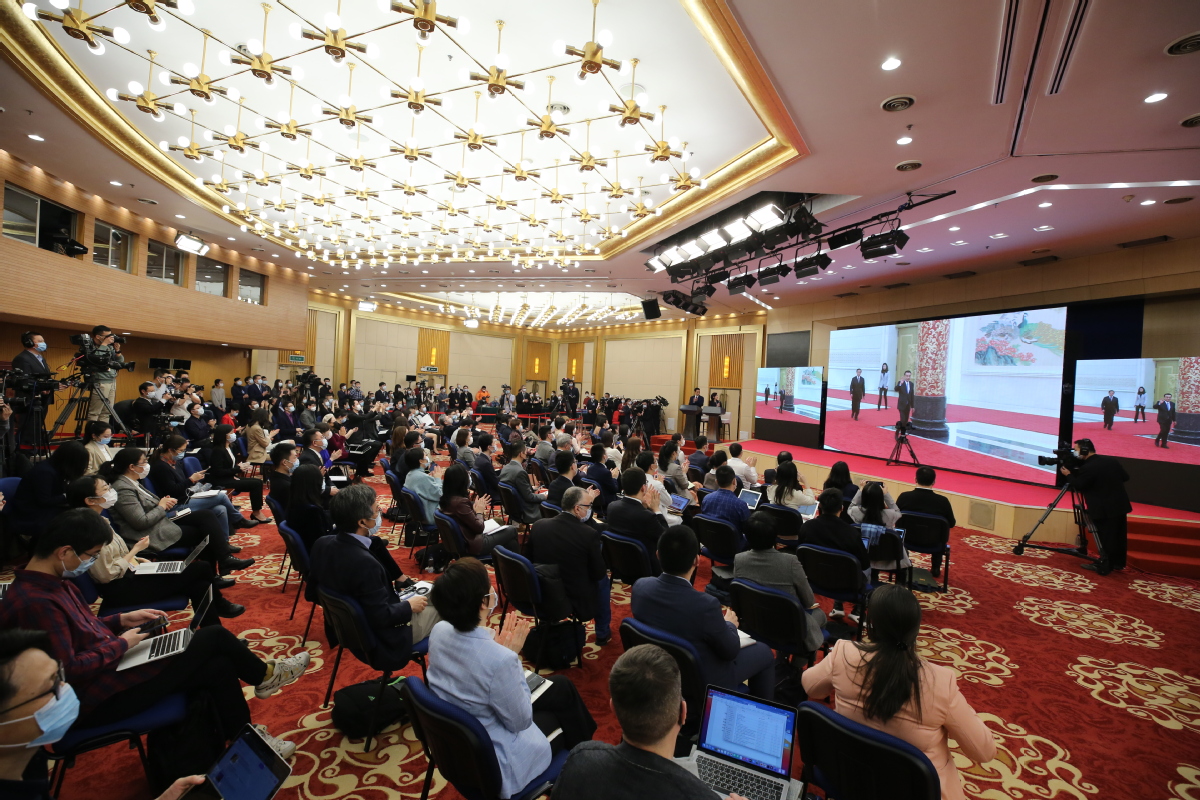
Premier Li Keqiang called on Thursday for China and the United States to carry out dialogue in multiple areas and at various levels to dispel misunderstandings and help manage and mitigate differences.
Even though the two countries cannot work everything out anytime soon, Beijing and Washington could exchange their opinions and enhance mutual trust through dialogue, Li told reporters after the conclusion of the fourth session of the 13th National People's Congress, China's top legislature.
The two sides should focus on their common ground and expand converging interests, Li said.
China and the US, as the world's largest developing and developed countries, respectively, both stand to gain from cooperation and lose from confrontation, he said.
China hopes the two countries will respect each other's interests and major concerns, refrain from interfering in each other's internal affairs and strive for sustained and healthy development of bilateral relations, he said.
"We hope that the China-US relationship will be future-oriented, overcome obstacles and move in a positive direction," Li said.
His remarks came as senior officials from the two nations are set to hold a high-level strategic dialogue in Anchorage, Alaska, next week.
The two-day meeting will be attended by Yang Jiechi, a member of the Political Bureau of the Communist Party of China Central Committee and director of the Office of the Foreign Affairs Commission of the CPC Central Committee, State Councilor and Foreign Minister Wang Yi, US Secretary of State Antony Blinken and US National Security Advisor Jake Sullivan.
This will be the first high-level, face-to-face diplomatic contact between the two countries since US President Joe Biden took office in January.
Foreign Ministry spokesman Zhao Lijian said in a statement on Thursday that China asks the US to view the country and bilateral relations in an objective and rational manner, and abandon a Cold War mentality and zero-sum game mindset.
The announcement of the meeting came exactly a month after a telephone conversation between President Xi Jinping and Biden.
During that phone call, Xi said China and the US should reestablish the various dialogue mechanisms in a bid to read each other's policy intentions accurately, adding that the foreign affairs departments of the two countries may have in-depth communications on wide-ranging matters.
Blinken, who talked with Yang on Feb 6 by phone, said on Wednesday that the meeting would be "an important opportunity for us to lay out in very frank terms the many concerns" with Beijing.
The timing of the meeting "at a mutually convenient but US territory-based site" shows the "seriousness about substance with China", said Douglas H. Paal, a senior researcher of the Asia Program at the Carnegie Endowment for International Peace.
"There might be a small substantive surprise," Paal said, adding that the basic result could be a mutual airing of concerns and red lines.
Yang Xiyu, a senior research fellow at the China Institute of International Studies, told the Global Times that Alaska is a suitable venue for an attempt by China and the US to cautiously make the initial step to reset ties.
"Alaska and Hawaii are less politically sensitive. When China and the US opened direct flights, the planes had to stop at Anchorage to refuel due to technology restrictions. So this city has special significance in the history of China-US relations," Yang Xiyu noted.
Li Haidong, a professor of US studies at China Foreign Affairs University, said that the high-level strategic dialogue is likely to become a fixed dialogue mechanism between China and the US in the next four years.
The two countries are expected to focus more on the results and carry out more small-scale and high-level dialogues for decision-makers to extend policies in order to avoid miscalculation, he added.
During the previous US administration, China-US relations plunged to the lowest point since the two countries forged diplomatic relations in 1979.
With the onset of the Biden administration, expectations have been running high among diplomatic, business and academic communities for a reset of the relationship.
A survey released on Tuesday by the American Chamber of Commerce found that US businesses in China are profoundly positive about doing business in 2021 and expect ties between Beijing and Washington to improve.
The survey found that 81 percent of the 345 respondents see their industries in China growing in 2021, while 45 percent see relations with the United States improving, up by 15 percentage points from last year.
Senior officials from China and the United States will hold a high-level strategic dialogue in Anchorage, Alaska on March 18 and 19, Foreign Ministry spokesman Zhao Lijian announced on Thursday.
The meeting will be attended by Yang Jiechi, a member of the Political Bureau of the Communist Party of China Central Committee and director of the Office of the Foreign Affairs Commission of the CPC Central Committee, Wang Yi, State Councilor and Foreign Minister, US Secretary of State Antony Blinken and US National security adviser Jake Sullivan, he said.
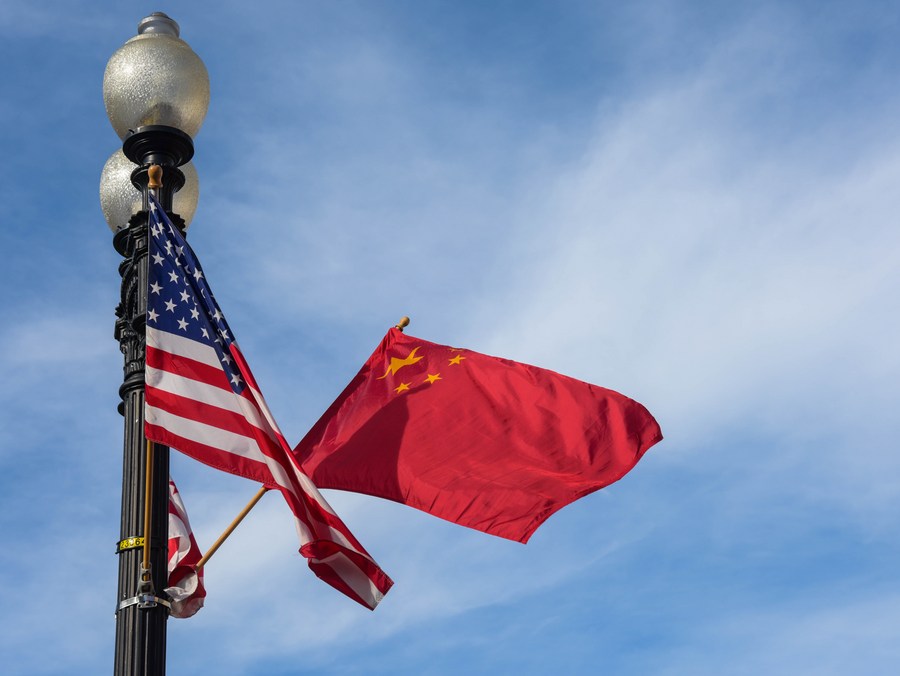
Senior Biden administration officials will meet with their Chinese counterparts in person next Thursday in Alaska, the first high-level diplomatic meeting to be held a month after top leaders of the two countries talked by phone.
US Secretary of State Antony Blinken and National Security Advisor Jake Sullivan will meet on March 18 in Anchorage, Alaska, with top Chinese diplomat Yang Jiechi and State Councilor and Foreign Minister Wang Yi to discuss "a range of issues" with China, the White House said Wednesday.
Yang is a member of the Political Bureau of the Communist Party of China Central Committee and director of the Office of Foreign Affairs Commission of the Communist Party of China Central Committee.
Blinken said on Wednesday that he would stop off in Alaska from a trip to Tokyo and Seoul. He would join Sullivan to meet the Chinese diplomats.
The announcement of the meeting came exactly a month after what US media reports called "an unusually long, two-hour call" between US President Joe Biden and Chinese President Xi Jinping.
During that phone call, Xi said that the foreign affairs departments of the two countries may have in-depth communications on wide-ranging matters in the bilateral relationship and major international and regional issues.
Blinken, who talked with Yang on Feb 6 by phone, said Wednesday that the meeting would be "an important opportunity for us to lay out in very frank terms the many concerns" with Beijing.
"We'll also explore whether there are avenues for cooperation. And we'll talk about the competition that we have with China to make sure that the United States has a level playing field, and that our companies and workers benefit from that," Blinken said in his first appearance before Congress since being confirmed as America's top diplomat.
The timing of the meeting "at a mutually convenient but US territory-based site" shows the "seriousness about substance with China", according to Douglas H. Paal, senior researcher of the Asia Program at the Carnegie Endowment for International Peace.
"There might be a small substantive surprise," Paal said, adding that the basic result could be a mutual airing of concerns and red lines.
China-US relations plunged to the lowest point during the previous administration since the two countries forged diplomatic relations in 1979.
With the onset of the Biden administration, expectations have been running high among diplomatic, business and academic communities for a reset of the world's "most consequential bilateral relationship".
Foreign Minister Wang said last week that China is ready to work with the US to follow through on the outcomes of the first presidential phone call and set China-US relations on a new path of "healthy and steady growth".
"We hope that the US will move in the same direction and remove all of its unreasonable restrictions on bilateral cooperation as early as possible and stop creating new obstacles," Wang said at a news conference Sunday in Beijing on the sidelines of the annual national legislative session.
On Tuesday, a survey released by the American Chamber of Commerce shows that US businesses in China are profoundly positive about doing business in 2021 and expect ties between Beijing and Washington to improve.
The survey found 81 percent of the 345 respondents see their industries in China growing in 2021, while 45 percent see relations with the United States improving, up by 15 percentage points from last year.
Last week, Chinese medical experts and their American colleagues held a virtual forum where they all underscored the need for the two countries to cooperate in fighting the COVID-19 pandemic.
John Allen, president of the Brookings Institution, said at the forum that the two countries have a long history of "constructive and productive collaboration" to combat diseases from SARS in 2003 to Ebola in 2015, and they need to join forces again for the world to emerge stronger from the pandemic.
